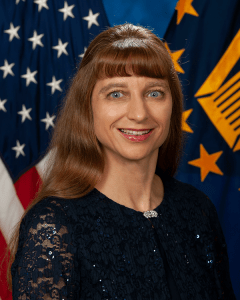An Interview with Chaplain Juliana Lesher, M.Div., Ph.D., BCC
 How did you end up working in healthcare?
How did you end up working in healthcare?
I knew as a young child that I was called to ministry, yet there were various health challenges and closed doors for ministry in the church, as a Military Chaplain, and in missions. During seminary, I learned of Clinical Pastoral Education (CPE). Having been hospitalized for nine extensive hospitalizations a child, teen, and young adult, I realized that God was sending me back to the hospital for ministry in hospital settings. For additional background, I’m sharing a link to a recent interview on me written by Regent University.
What is your experience with the role of spiritual care when working with veterans in pain?
For two decades, I have worked with Veterans and non-Veterans in pain both as individuals and leading spiritual discussion groups. I have witnessed the power of spiritual care as part of the healing process and have co-written a book series to help others, among other resources. With a steel rod from my neck to tailbone, a complete spinal fusion, and nerve damage…I live with chronic pain, so I share in this journey on a personal level too.
What prompted you to work on new codes for spiritual care at the VA?
As some brief history, VA chaplains used the 999499 CPT code from the 1990s to 2014. This unspecified code was never billable, but it made chaplains part of the clinical count, nonbillable workload within the VA’s VERA (Veterans Equitable Resource Allocation) system. Then in 2014 this code was taken away and chaplains became administrative overhead – this was a huge setback for VA Chaplains. With chaplains being viewed as administrative overhead and not part of the clinical count, nonbillable workload, it negatively impacted the desire of facilities to hire chaplain staff.
I did some homework and in 2016, I went to the American Medical Association (AMA) meeting to try to get a CPT code approved. With chaplaincy not licensed due to separation of Church and State, a CPT code was denied. Then I investigated the CMS (Centers for Medicare & Medicaid) HCPCS (Healthcare Common Procedure Coding System) Codes for VA Chaplains. In 2019 while serving a 2-year term as National Director of VA Chaplain Service for the Department of Veterans Affairs, I sought support from VA Senior Leadership for the HCPCS Code request from CMS. I explained to leadership why having a HCPCS Code for VA Chaplaincy is important, and VA Central Office leadership was supportive of this effort.
What were the sticking points for approval and how did you address those things?
As I had shared from the AMA experience, I knew licensing and billing would be sticking points, so I addressed these things in the process. Because this code would not be for billing (due to VA’s unique VERA model), I think this was what allowed it to ultimately get approved. I had hoped that the code would be available for clinical chaplains anywhere, but because of this issue, it is a code specifically for the VA.
Congratulations! What was the specific determination made?
Q9001 – For spiritual assessment
Q9002 – For individual chaplain counseling
Q9003 – For chaplain-led groups
The codes are non-billable and allow chaplains to be part of the clinical count, nonbillable workload for VA. These codes will become effective on October 1, 2020. With more spiritual care provided in VA facilities, it will make a positive and meaningful difference in the lives of our Veterans.
Do you have advice to offer to the range of healthcare providers involved when caring for people with pain – for those who may not know how to effectively integrate spiritual care into their current practice?
Our physical, emotional, mental, social, and spiritual well-being are all interrelated. When one aspect of our being is suffering, other components of our life are negatively impacted. When we ignore one aspect of our being, we also do not provide a complete opportunity for wellness in all aspect of our life and being.
Spiritual practices which include prayer, meditation, rituals, and meaning-making provide us with opportunities for reflection and renewal which can lead to inner peace, acceptance, and understanding. If anyone is interested in resources which I have written or Power Points about spiritual care and pain, please email Juliana.Lesher@va.gov.
Related Article:
The Role of Spiritual Care in Comprehensive Integrative Pain Management (CIPM)
Related Article:
15th Annual GWish Art of Presence Healthcare Renewal Retreat [Virtual]

Trackbacks/Pingbacks